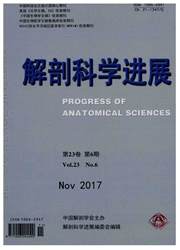

 中文摘要:
中文摘要:
目的 Frat1蛋白在食管癌、卵巢癌、中枢神经系统肿瘤中有异常表达,但是在非小细胞肺癌(NSCLC)组织中的表达情况研究甚少,其表达情况与患者预后之间是否存在相关性等尚不清楚。方法用免疫组化SP法对100例原发性NSCLC患者手术标本中Frat1的表达进行检测。结果 Frat1蛋白在肺癌组织中的表达明显增强,Frat1的阳性表达与分化程度(P=0.022)、淋巴结转移(P=0.016)和TNM分期正相关(P=0.011),并且Frat1阳性表达患者的术后生存时间(41.651±4.445个月)明显低于阴性者(74.222±6.844个月,P=0.035)。结论 Frat1在NSCLC中过表达,与肺癌的侵袭和转移等恶性表型有关,Frat1的异常表达提示NSCLC患者的不良预后。
 英文摘要:
英文摘要:
Objective As a positive regulator of the Wnt signal pathway,frequently rearranged in advanced T-cell lymphomas(Frat1) overexpressed in some human tumors,but the role of Frat1 in non-small cell lung cancer(NSCLC) is not clear,the purpose of this study is to investigate the expression and correlations of Frat1 with clinic-pathologic parameters and prognosis in lung cancer.Method Immunohistochemistry was performed on 100 cases of NSCLC with complete follow-up records.The correlations between expressions of Frat1 and clinic-pathological characteristics and prognosis were analyzed.Results Frat1 was not detected in normal bronchial and alveolar epithelium,while it was positively expressed in 63(63.00%) of 100 NSCLC cases.The expression level of Frat1 was positively related to tumor differentiation,TNM stage and lymph node metastasis(0.05).The Kaplan-Meier survival analysis showed that survival time was significantly shorter in Frat1 positive expression cases than in Frat1 negative expression cases(0.01).Conclusion Overexpression of Frat1 in NSCLC is associated with malignant phenotype and poor prognosis,down-regulation of Frat1 expression can restrain the invasive ability of lung cancer cells.
 同期刊论文项目
同期刊论文项目
 同项目期刊论文
同项目期刊论文
 Leucine zipper tumor suppressor 2 inhibits cell proliferation and regulates Lef/Tcf-dependent transc
Leucine zipper tumor suppressor 2 inhibits cell proliferation and regulates Lef/Tcf-dependent transc Expression of metastasis-associated protein 2 (MTA2) might predict proliferation in non-small cell l
Expression of metastasis-associated protein 2 (MTA2) might predict proliferation in non-small cell l Expression of Frat1 correlates with expression of beta-catenin and is associated with a poor clinica
Expression of Frat1 correlates with expression of beta-catenin and is associated with a poor clinica Overexpression of small GTPases directly correlates with expression of delta-catenin and their coexp
Overexpression of small GTPases directly correlates with expression of delta-catenin and their coexp Ataxia-telangiectasia group D complementing gene (ATDC) promotes lung cancer cell proliferation by a
Ataxia-telangiectasia group D complementing gene (ATDC) promotes lung cancer cell proliferation by a Overexpression of Frat1 correlates with malignant phenotype and advanced stage in human non-small ce
Overexpression of Frat1 correlates with malignant phenotype and advanced stage in human non-small ce P120-Catenin Isoforms 1 and 3 Regulate Proliferation and Cell Cycle of Lung Cancer Cells via beta-Ca
P120-Catenin Isoforms 1 and 3 Regulate Proliferation and Cell Cycle of Lung Cancer Cells via beta-Ca Clinicopathological significance of cathepsin D expression in non-small cell lung cancer is conditio
Clinicopathological significance of cathepsin D expression in non-small cell lung cancer is conditio Diversin increases the proliferation and invasion ability of non-small-cell lung cancer cells via JN
Diversin increases the proliferation and invasion ability of non-small-cell lung cancer cells via JN Ataxia-telangiectasia group D complementing gene (ATDC) upregulates matrix metalloproteinase 9 (MMP-
Ataxia-telangiectasia group D complementing gene (ATDC) upregulates matrix metalloproteinase 9 (MMP- Ascertaining an appropriate diagnostic algorithm using EGFR mutation-specific antibodies to detect E
Ascertaining an appropriate diagnostic algorithm using EGFR mutation-specific antibodies to detect E Downregulation of HDPR1 Is Associated With Poor Prognosis and Affects Expression Levels of p120-Cate
Downregulation of HDPR1 Is Associated With Poor Prognosis and Affects Expression Levels of p120-Cate p120ctn isoform 1 expression significantly correlates with abnormal expression of E-cadherin and poo
p120ctn isoform 1 expression significantly correlates with abnormal expression of E-cadherin and poo Dishevelled-1 and Dishevelled-3 Affect Cell Invasion Mainly Through Canonical and Noncanonical Wnt P
Dishevelled-1 and Dishevelled-3 Affect Cell Invasion Mainly Through Canonical and Noncanonical Wnt P 期刊信息
期刊信息
